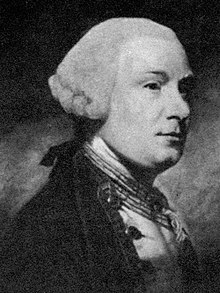Robert Duff (Royal Navy officer)
| Robert Duff | |
|---|---|
 |
|
| Born | c. 1721 |
| Died | 6 June 1787 Queensferry, Scotland |
| Allegiance |
|
| Service/branch |
|
| Rank | Admiral |
| Commands held | |
| Battles/wars |
War of the Austrian Succession Seven Years' War American War of Independence |
| Relations |
William Duff, 1st Earl Fife (cousin) George Duff (grandnephew) Norwich Duff (great-grandnephew) Robert Duff (great-grandson) |
Robert Duff (c.1721 – 6 June 1787) was an officer of the Royal Navy during the War of the Austrian Succession, the Seven Years' War and the American War of Independence. He rose to the rank of Admiral, and served briefly as colonial governor of Newfoundland.
Duff was born c. 1721, among the youngest of more than thirty children of Patrick Duff of Craigston, by Craigston's second wife. Little is known about his early life, but a story that does survive attests to his father's fecundity and possibly also to Robert's own spirited approach. Walking in his garden the father, Patrick Duff, came across a small boy and enquired 'And wha's laddie are you?' to which his son, the future Admiral Robert Duff, replied 'Dinna ye ken your ain son Robbie, ye auld fool!'. Robert joined the navy and was listed a lieutenant by 9 March 1739. He was advanced to commander on 4 December 1744, and by 1746 was in command of the bomb vessel HMS Terror, serving off the Scottish coast. Duff received the command of the 44-gun Anglesea on 23 October, and remained in her off the Irish and English coasts until the signing of the Treaty of Aix-la-Chapelle in 1748 ended the War of the Austrian Succession.
Duff's next ship was the 50-gun HMS Rochester, which he joined in 1755. He spent several years cruising, either independently or as part of the main fleet, and in 1758 was part of Commodore Richard Howe's squadron defending the expeditions against St Malo, Cherbourg and St Cas. He became senior officer of a small squadron stationed off Brittany in 1759, watching the French fleet in Morbihan, while a fleet under Edward Hawke blockaded Brest, France. While at anchor in Quiberon Bay on 20 November, his scouts reported a large French fleet to the south of Belle Île. Duff hurried his squadron, consisting of four 50-gun ships and four frigates, out to sea while the French chased them. Before they could be caught, the main fleet under Hawke came up and overran the French, defeating them in the decisive Battle of Quiberon Bay.
...
Wikipedia
